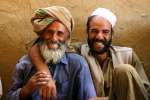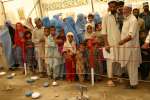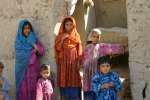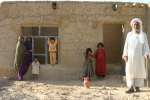Project in Pakistan ensures health services for both refugees and locals
News Stories, 27 May 2013
CHAMKANI, Pakistan, May 27 (UNHCR) – Nineteen-year-old Naila is expecting her first child in two months and comes for regular medical check-ups at the new reproductive health care unit in a government-run Basic Health Unit (BHU) in the remote town of Chamkani.
Until a year ago, the 23,000 Pakistani and 7,000 Afghan refugees living beside each another in impoverished Chamkani had faced a long, arduous and expensive drive to hospitals in the city of Peshawar to find an ante-natal and post-natal health care facility.
The Chamkani project is one of seven BHUs established in different parts of the Peshawar district in north-west Pakistan under the Refugee Affected and Hosting Area (RAHA) programme, which was initiated in 2009 by UNHCR to strengthen government-run health care centres.
RAHA was launched in 2009 in recognition of Pakistan's role in hosting 1.6 million registered Afghan refugees for over three decades – the world's largest refugee population.
UNHCR, with many other humanitarian and development actors, is helping communities that have hosted refugees by implementing projects to provide livelihoods, improve infrastructure and rehabilitate the environment in over 41 rural districts across the country. Around 3.9 million (585,000 Afghan refugees and 3.315 million Pakistani citizens) are currently benefitting from these projects in Pakistan.
The seven BHUs in areas outside of Peshawar were supported through the construction of labour rooms, recovery rooms and waiting areas as well as through renovation of buildings. Assistance included medical equipment and training for traditional birth attendants and female health visitors. Afghans and Pakistanis have equal access.
Naila, a local Pakistani, was accompanied by her sister-in-law for her periodic check-up, care previously deemed necessary for pregnant women only in an emergency. At the newly constructed reproductive health care unit, women reported they had been encouraged by mothers-in-law and husbands to get routine check-ups because of the proximity of the BHU.
"This is a big relief to us. Now we don't need to wait for our male family members to come and take us or our children to the hospital," Naila's sister-in-law, Begam Jan, told the UNHCR team. "We bring our children here for vaccination; this hospital (BHU) is literally on our doorstep."
After the ultrasound examination, Aneela, the Medical Officer at the BHU, informed Naila that her baby was healthy but she should try to maintain a healthier lifestyle. Patients are charged a token fee of five rupees for the ultrasound examination, a procedure that would be one hundred times more expensive at private clinics and hospitals.
It is estimated that some 273,000 locals and Afghan refugees are currently benefitting from the RAHA health care interventions in the Peshawar area.
The daily attendance report indicates that more than 41,000 patients, including some 15,600 Afghan refugees, have been treated at the BHU during the past one-and-a-half years.
"UNHCR acknowledges and appreciates the enduring support which the government and people of Pakistan have extended to Afghan refugees," said Neill Wright, UNHCR's representative to Pakistan. "UNHCR will continue to seek international funds for programmes to support the host communities as well as the Afghan refugees, and to implement projects that ensure both communities have access to improved social services."
The RAHA initiative is an important component of the regional Solutions Strategy for Afghan Refugees that was endorsed a year ago by the governments of Afghanistan, Iran and Pakistan, along with UNHCR. The strategy includes a second and expanded phase of the RAHA initiative.
By Duniya Aslam Khan in Chamkani, Pakistan




















































